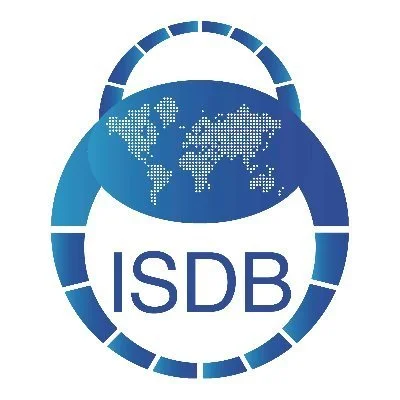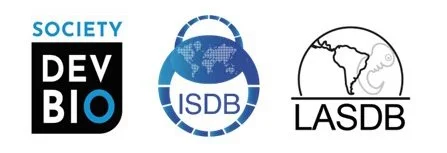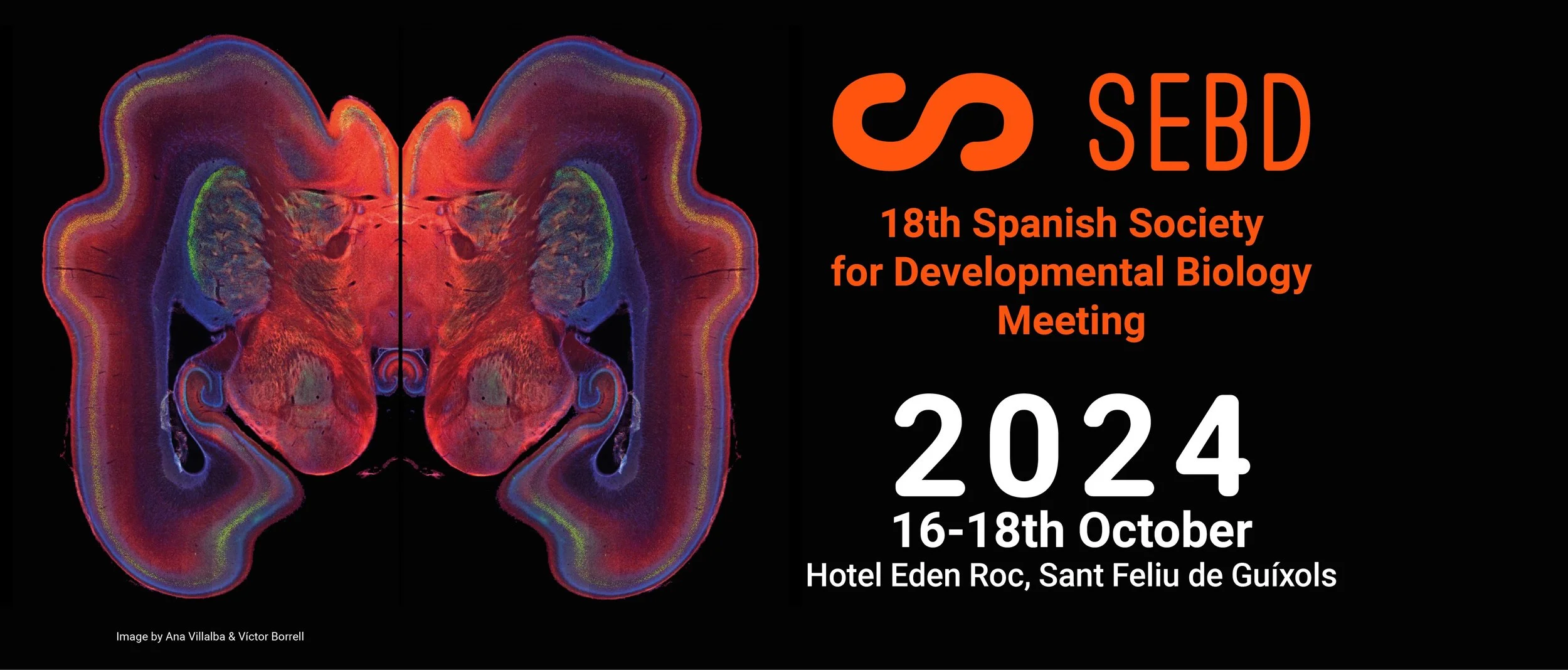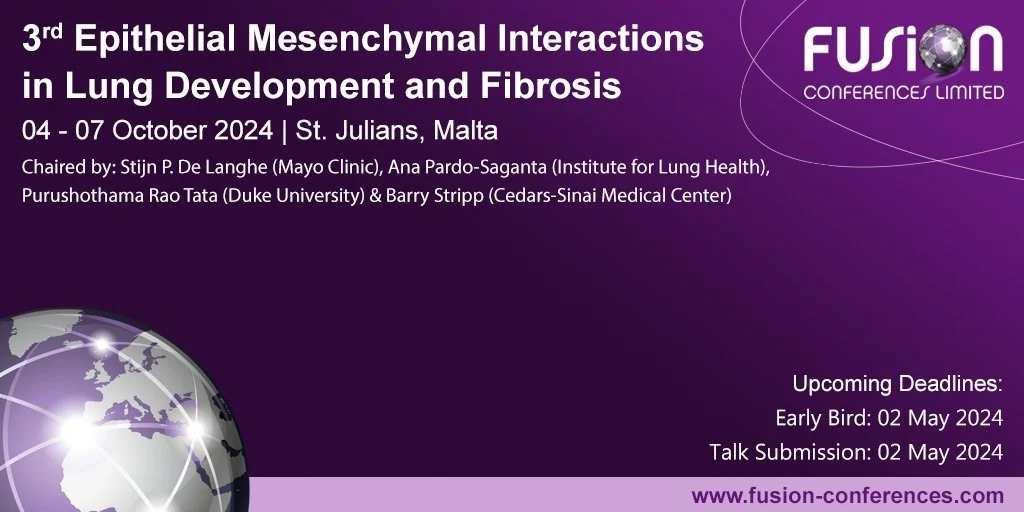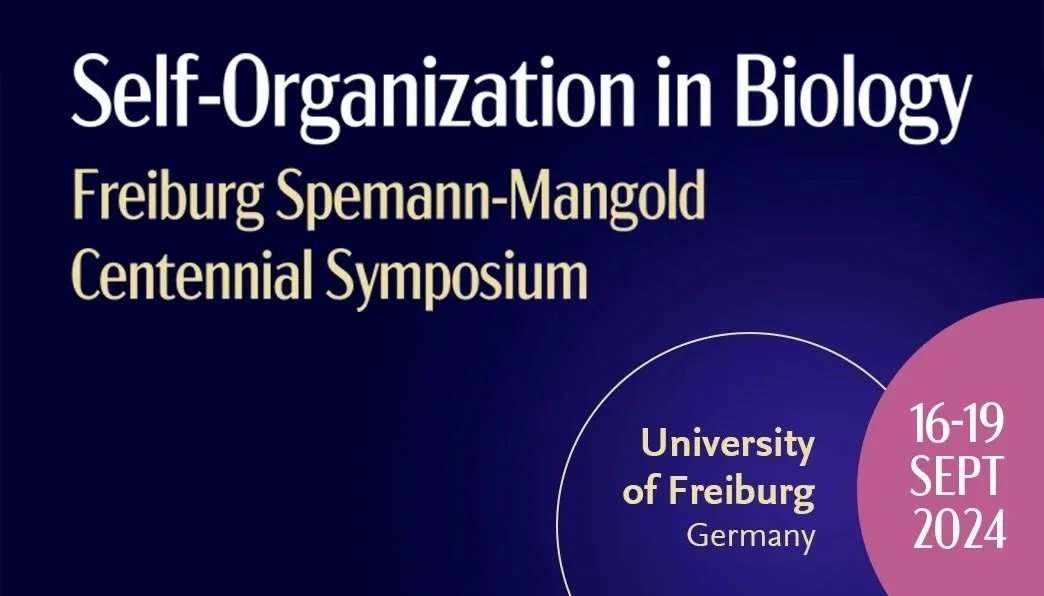
UPCOMING MEETINGS

Italian National Ph.D. Meeting
The joint ABCD–SIBBM National Ph.D. Meeting 2026 is a three-day event that will take place in Ferrara — a city rich in history and science.
This unique meeting brings together Ph.D. students from across Italy who work in cellular, molecular, and developmental biology. It’s an opportunity to share your work, exchange ideas, and connect with peers and experts in a friendly and stimulating environment.
Keynote Speakers:
Elena PALMA, Foundation for Liver Research, London, UK and
Stephen TAIT, University of Glasgow, UK
Website: https://dott2026.azuleon.org/welcome
Organizers: Massimo Bonora (University of Ferrara), Sirio Dupont (University of Padua), Giovanni Capranico (University of Bologna) & Nicoletta Landsberger (University of Milan)
Contact: bnrmsm1@unife.it

Joint international meeting of the German (GfE), Dutch (DSDB), and Spanish Societies (SEBD) for Developmental Biology “Development & Regeneration”, Potsdam
The next meeting of the German Society of Developmental Biology will be held together with the Spanish (SEDB) and the Dutch (DSDB) Societies for Developmental Biology in Potsdam between March 10-13, 2026:
This meeting will feature a truly excellent selection of speakers. The location of our meeting will be in Potsdam-Griebnitzsee, close to the UNESCO world heritage sites of the beautiful castles and park landscapes of Potsdam/Berlin. We are excited about bringing this meeting to a scientifically- and culturally-rich area of Germany.
This conference serves as a platform for international exchange in developmental biology. The scientific program covers a broad range of topics – from fundamental mechanisms of plant and animal development to stem cell-based disease and regeneration models. The focus is on supporting young researchers and fostering networking: young scientists present their research in lectures, poster sessions, or as session chairs and can win several prestigious awards.
We anticipate a participation of > 250 scientists working in the fields of developmental and cell biology. Among the participants are a number of researchers who are in postdoctoral positions or in the process of establishing their own labs.
Website: https://www.uni-potsdam.de/en/gfe-meeting-potsdam-2026/index
Contact: gfe2026@uni-potsdam.de
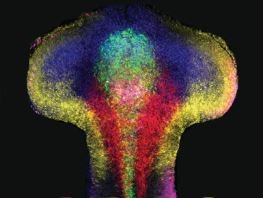
BSDB 2026: Molecules to Morphogenesis
The British Society for Developmental Biology 2026 Spring meeting is our annual flagship meeting “From Molecules to Morphogenesis” brings together our vibrant international research community, highlighting cutting edge animal and plant developmental systems.
Contact: events@hg3.co.uk
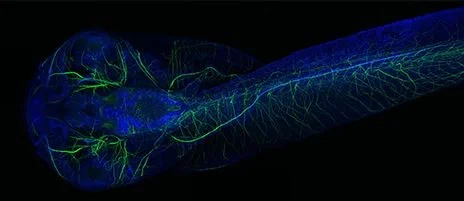
Cell & Developmental Biology of Xenopus: Gene Discovery & Disease
Cell & Developmental Biology of Xenopus: Gene Discovery & Disease
Application Deadline: January 16, 2026
Arrival: April 7, 2026 by 6 pm EST
Departure: April 21, 2026 around 12 pm EST
CSHL Courses are intensive, running all day and often including evenings and weekends; students are expected to attend all sessions and reside on campus for the duration of the course.
Instructors:
Rachel Miller, UTHealth Houston, McGovern Medical School
Peter Walentek, Universitätsklinikum Freiburg, Germany
Twitter: @cshlxeno
Website: https://meetings.cshl.edu/courses.aspx?course=C-XENO
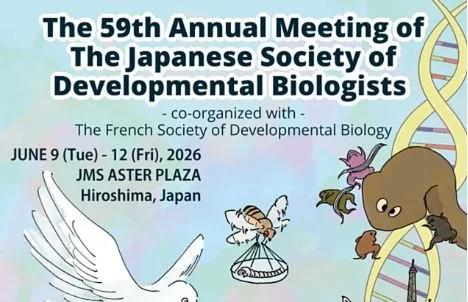
JSDB 59th Meeting
The 59th Annual Meeting of The Japanese Society of Developmental Biologists
-co-organized with-
The French Society of Developmental Biology
JUNE 9 (Tue) - 12 (Fri), 2026
JMS ASTER PLAZA
Hiroshima, Japan
Plenary Lectures:
Ken W. T. Cho (UC Irvine)
Yoshiko Takahashi (Kyoto Univ)
Laure Bally-Cuif (Institut Pasteur)
Educational Lecture (in Japanese): Kyokazu Agata (NIBB; Kyoto Univ)
Online Registration: FEB 24 (Tue) - APR 30 (Thu), 2026
Abstract Submission: FEB 24 (Tue) - MAR 6 (Fri), 2026
Chair: Hajime Ogino (Hiroshima Univ)
Website: https://pub.confit.atlas.jp/en/event/jsdb2026

Geometry and Intercellular Interactions in Morphogenesis of Animals and Plants
The Kavli Institute for Theoretical Physics (UC Santa Barbara) will hold a five-week, interdisciplinary workshop on morphogenesis in summer 2026.
How do living organisms reliably build complex structures from single cells, despite the variability of their components and environments? What determines the emergence of organized patterns, the timing of developmental transitions, or the reproducibility of shape across individuals and species? While genetics has revealed many of the molecular players involved, the fundamental principles that govern the transformation from cell to tissue to organism remain elusive. Developmental systems exhibit remarkable coordination across scales—from gene expression to mechanical forces to tissue geometry—but how these levels interact to produce robust morphogenesis is still not well understood.
This program will bring together experimentalists and theoreticians to work towards uncovering unifying rules of development and building bridges between distinct biological systems. Central topics include how geometry and mechanical feedback influence growth and differentiation; how cell identities emerge from high-dimensional gene expression landscapes; and how large-scale coordination is achieved in development, regeneration, and repair. By comparing independently evolved systems across the animal and plant kingdoms, this program seeks to uncover shared strategies in developmental biology and foster interdisciplinary collaboration.
The program will be complemented by the QBio Summer Research Course for graduate students and postdocs, training the next generation of scientists in cutting-edge tools and concepts in quantitative developmental biology.
Website: https://www.kitp.ucsb.edu/activities/MORPHO26
Organizers: Dominique Bergmann (Stanford), Fridtjof Brauns (KITP), and Stefano Di Talia (Duke)
Contact: sherriffs@kitp.ucsb.edu
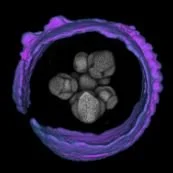
KITP QBio Summer Research Course: Physical Principles of Morphogenesis in Plants and Animals
Physical Principles of Morphogenesis in Plants and Animals, the KITP QBio Summer Course, will run from July 20 - August 21, 2026 at the Kavli Institute for Theoretical Physics, UC Santa Barbara. Postdocs and advanced graduate students with physical, mathematical, and life science backgrounds are invited to apply.
Developmental systems exhibit remarkable coordination across scales—from gene expression to mechanical forces to tissue geometry—but how these levels interact to produce robust morphogenesis is still not well understood. This hands-on research course will integrate laboratory projects, computational data analysis, and mathematical modeling, aiming to achieve quantitative understanding of specific morphogenetic processes in a variety of model animal and plant developmental systems. Students will also attend lectures in the concurrent KITP program Geometry and Intercellular Interactions in Morphogenesis of Animals and Plants.
Visit the KITP QBio website for a course description and the online application and recommendation letter forms. The application deadline is February 1, 2026.
Website: https://www.kitp.ucsb.edu/qbio
Application deadline: February 1, 2026
Fees: The $2925 course fee covers student room and board.
Course Directors: Adrienne Roeder (Cornell) and Sebastian Streichan (UC Santa Barbara)
Contact: qbioschool@kitp.ucsb.edu
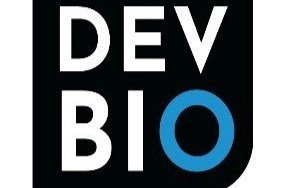
Society for Developmental Biology 85th Annual Meeting
Program Committee Chair: Richard Behringer, SDB President, University of Texas MD Anderson Cancer Center.
More info coming.
Website: https://www.sdbonline.org/meetings

The 5th Nordic Meeting on Development, Stem Cells and Regeneration
The programme features keynote lectures from world-leading scientists, invited talks from across Europe, and opportunities for PhD students and postdocs to present their work, receive valuable feedback and build new connections.
Registration will open in January 2026.
Website: https://www.swedbo.se/the-5th-nordic-meeting-on-development-stem-cells-and-regeneration/
Contact: nordicdevbio2026@uu.se
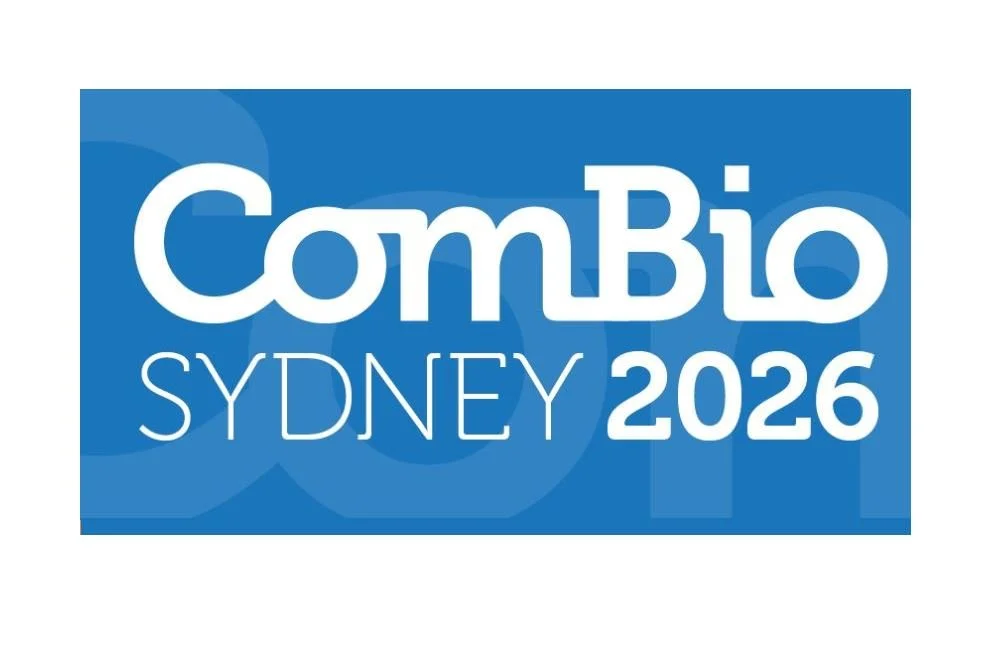
ComBio2026
ComBio2026
Held biennially, ComBio brings together the annual conferences of the
• Australian and New Zealand Society for Cell and Developmental Biology (ANZSCDB)
• Australian Society for Biochemistry and Molecular Biology (ASBMB)
• New Zealand Society for Biochemistry and Molecular Biology (NZSBMB)
• Australian Society of Plant Scientists (ASPS)
This dynamic three-day conference will feature an exciting program of plenary lectures, symposia, lightning talks and poster presentations, highlighting cutting-edge research across a broad spectrum of disciplines, including:
• Cell and Developmental Biology
• Biochemistry and Metabolism
• Proteins, Peptides, and Structural Biology
• Plant Biology
• RNA
• 'Omics and Systems Biology
• Education
We are pleased to invite abstract submissions for the ComBio 2026 Conference, with the deadline for abstract submission being 5pm AEST Monday 13 April 2026.
Contact: combio@wsm.com.au
Website: https://www.combio.org.au/
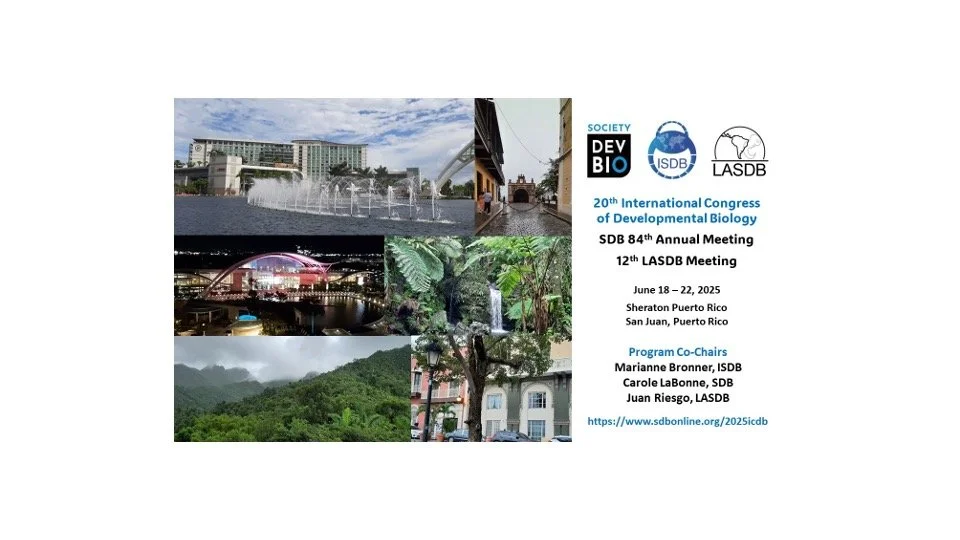
20th International Congress of Developmental Biology
SDB 84th Annual Meeting
12th LASDB Meeting
Program Co-Chairs
Marianne Bronner, International Society of Developmental Biology
Carole LaBonne, Society for Developmental Biology
Juan Riesgo, Latin American Society of Developmental Biology
Presidential Symposium
Frontiers in Developmental Biology
Plenary Sessions
Juneteenth Celebration
Transcriptional and epigenetic control of development
Regenerative systems
Evolution and development of organ systems
Concurrent Sessions
Morphogenetic influences on development
Role of cell memory in fate decisions
Cell Polarity
Generation of in vitro embryo models
Cell signaling in development
Role of scaling in development and evolution
Emergence of evolutionary novelty
Extracellular matrix influences on cell behavior
Cell shape and variation
Relationship between development and aging
Pattern formation
Emergent properties
Regeneration of tissues and organs
Metabolic influences on development
Oscillations that shape development
Awards
Ross G. Harrison Medal
Edwin G. Conklin Medal
Developmental Biology-SDB Lifetime Achievement Award
Viktor Hamburger Outstanding Educator Prize
Elizabeth D. Hay New Investigator Award
Latin American Young Investigator Award
SDB Trainee Science Communication Award
Confirmed Speakers
Yasuko Akiyama • Alexander Aulehla • Déborah Bourc'his • Heather Bruce • Benoit Bruneau • Jorge Casal • Cheng-Ming Cheuong • Justin Crocker • Alfredo Cruz-Ramirez • Stefan de Folter • Andrés Dekanty • Stefano Di Talia • Denis Duboule • Cassandra Extavour • D’Juan Farmer • Jessica Feldman • Eileen Furlong • José García-Arrarás • Bob Goldstein • Jérôme Gros • Anja Groth • Zena Hadjivasiliou • Tsuyoshi Hirashima • Sally Horne-Badovinac • Aissam Ikmi • Robb Krumlauf • Megan Martik • Roberto Mayor • Margaret McFall-Ngai • Eskeatnaf Mulugeta • Rosa Navarro • Ángela Nieto • Christian Petersen • Michael Piacentino • Kristy Red-Horse • Seung Yon (Sue) Rhee • Daniel Ríos Barrera • Tatjana Sauka-Spengler • David Sherwood • Mansi Srivastava • Yi-Hsien Su • Margherita Turco • Gert Jan C. Veenstra • Pablo Wappner • Aryeh Warmflash • Jessica Whitehead • Andrea Wills • Magdalena Zernika-Goetz

Meeting 18th Spanish Society for Developmental Biology Meeting
The Spanish Society for Developmental Biology (SEBD) is proud to announce the 18th meeting of the Society to be held from October 16-18, 2024 at the Hotel Eden Roc in Sant Feliu de Guíxols.
This meeting will be an excellent opportunity to discover the latest experimental approaches and future directions in Developmental and Cell Biology as well as to discuss new data and ideas.
Sessions will be organized around the most up-to-date scientific topics in Developmental Biology.
Each session will be headed by a world leader in these fields and a prominent place will be reserved for oral contributions from PIs and postdocs that will be selected from the abstracts for all sessions. There will be short sessions devoted to posters’ flash-talks. The meeting will also be home to the José Luis Gomez-Skarmeta prize in Developmental Biology and the Ph.D. theses prizes from the SEBD.
We are confident that this meeting will be an excellent occasion to foster fruitful scientific interactions and discussions.
We look forward to seeing you all at the 18th SEBD Meeting!
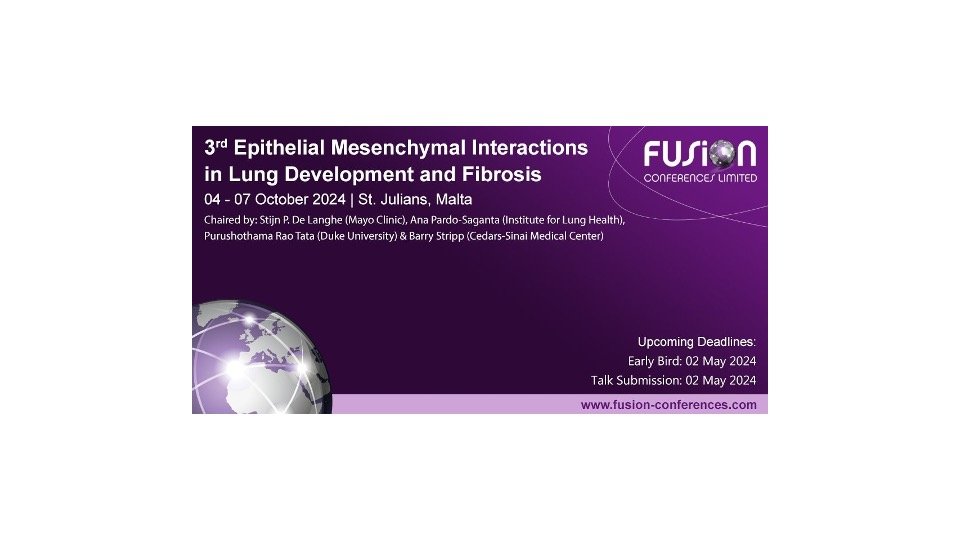
3rd Epithelial Mesenchymal Interactions in Lung Development and Fibrosis
Lung development is governed by epithelial-mesenchymal interactions. These pathways are recapitulated during injury and repair. This conference will focus on understanding key processes underlying lung development, injury and repair in the context of age, environment and species, with the hope of better understanding disease development and to discover novel therapeutic approaches.
We will highlight critical issues on lung epithelial biology such as stem cells and regenerative medicine, while expanding sessions to encompass themes such as single cell analytical approaches, cell-cell communication, dissect the biological distinctions mesenchymal proliferation as a repair mechanism and fibrosis; present the impact of new tools in single cell analysis on understanding lung development, repair, and disease; and characterize epithelial-mesenchymal interrelationships that maintain lung homeostasis and orchestrate repair and regeneration. The entire program has been designed to achieve a better understanding of the key clinical research issues and how they relate to basic mechanistic investigation.
Key Sessions
Keynote and Emerging Topics
Novel models and technologies to study pulmonary fibrosis
Mechanisms of repair in lung disease
Pathways regulating Lung Development and dysregulated/activated in lung fibrosis
Aging, Fibrosis and degenerative lung diseases
Environmental impact on lung diseases
Mechanotransduction In Lung Development and Fibrosis
Aging and Lung Fibrosis
Confirmed Keynote Speaker
Mark Krasnow (Stanford University)
Confirmed Invited Speakers
Denise Al Alam (The Lundquist Institute)
Douglas Brownfield (Mayo Clinic)
Oliver Eickelberg (University of Pittsburgh)
John Engelhardt (University of Iowa)
ASSESSING LUNG INJURY AND REPAIR USING TRANSGENIC FERRET MODELS
Andreas Günther (University of Giessen)
Claudia Jackubzick (Dartmouth College)
BIOLOGY OF LUNG MACROPHAGES IN HEALTH AND DISEASE
Vladimir Kalinichenko (University of Arizona College of Medicine, Phoenix)
DEVELOPING NEW THERAPEUTIC APPROACHES FOR PERINATAL LUNG DISEASES
Naftali Kaminski (Yale School of Medicine)
STEM CELL FAILURE AND ALVEOLAR PLASTICITY IN HUMAN PULMONARY FIBROSIS
Harry Karmouty-Quintana (UT Health Houston)
SINE OCULIS HOMEOBOX 1 (SIX1) A NOVEL PRO-FIBROTIC MEDIATOR
David Lagares (Harvard University)
Joo-hyeon Lee (University of Cambridge)
Claude Jourdan Le Saux (University of California San Francisco)
SECRETED FRIZZLED RELATED PROTEIN 2 CONTRIBUTES TO THE TRANSDIFFERENTIATION OF HUMAN ALVEOLAR EPITHELIAL TYPE II CELLS
Mitsuru Morimoto (RIKEN)
AUTOCRINE TGF-β-POSITIVE FEEDBACK IN PROFIBROTIC AT2-LINEAGE CELLS PLAYS A CRUCIAL ROLE IN NON-INFLAMMATORY LUNG FIBROGENESIS
Enid Neptune (Johns Hopkins University)
EXPLORING THE INTERFACE OF GENETIC DISORDERS AND COPD-EMPHYSEMA
Marko Nikolic (University College London)
HUMAN LUNG AND IMMUNE DEVELOPMENT IN HEALTH AND DISEASE
Jayaraj Rajagopal (Massachusetts General Hospital)
Elizabeth Redente (National Jewish Health)
REDUCING FIBROBLAST PERSISTENCE IN PULMONARY FIBROSIS AS A MECHANISM OF RESOLUTION
Laila Roudsari (United Therapeutics)
FROM CELLS TO ORGAN: THE BUILDING BLOCKS FOR GENERATING FUNCTIONAL LUNG TISSUE
Herbert Schiller (Helmholtz Munich)
Jennifer Sucre (Vanderbilt University)
Xin Sun (UC San Diego)
Aleksandra Tata (Duke University)
Matthew James Thomas (Boehringer Ingelheim)
IN VITRO MODELS OF EPITHELIUM IN PULMONARY FIBROSIS
Andrew Vaughan (University of Pennsylvania)
REGENERATION AND INFLAMMATION IN VIRAL PNEUMONIA: A BALANCING ACT
Ana Ivonne Vazquez-Armendariz (University of Bonn)
Rachel Zemans (Michigan Medicine)
TRANSITIONAL STATES IN LUNG REGENERATION AND FIBROSIS
Target Audience
Lung developmental biologists
Stem cell researchers
Fibrosis researchers
Pulmonary fibrosis researchers
#Fusionlung24
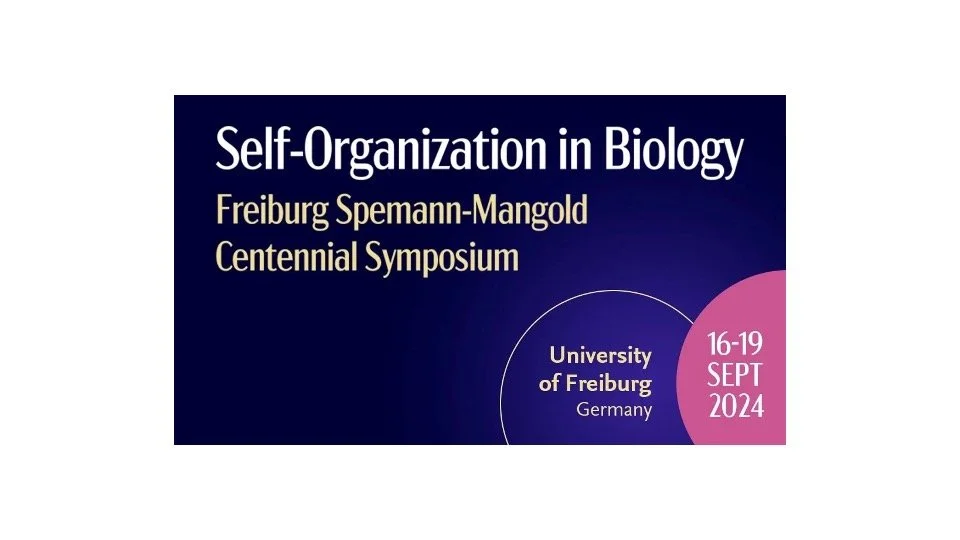
Self-Organization in Biology: Freiburg Spemann-Mangold Centennial Symposium
The Self-Organization in Biology: Freiburg Spemann-Mangold Centennial Symposium celebrates 100 years of scientific advances rooted in Hilde Mangold’s and Hans Spemann’s discovery of the gastrula organizer in vertebrate development, published in 1924 and awarded the Nobel Prize in Physiology or Medicine in 1935.
